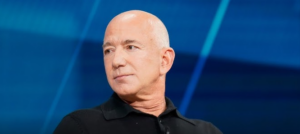Jeff Bezos' Earth Fund, which has previously championed climate initiatives, has decided to halt its funding for the Science Based Targets Initiative (SBTi), a significant organization dedicated to assessing corporate emissions reductions in alignment with the Paris Climate Agreement. This strategic pivot follows U.S. President Donald Trump's formal withdrawal from the Paris Agreement, prompting a reevaluation of Bezos' climate activism.
Bezos Shifts Focus: Earth Fund Pulls Support from Key Climate Initiative

Bezos Shifts Focus: Earth Fund Pulls Support from Key Climate Initiative
The Jeremy Bezos-led Earth Fund retracts its backing from the Science Based Targets Initiative and expands initiatives in the defense sector.
Previously, the Earth Fund was a major financial contributor to SBTi, having allocated a £14.5 million grant back in 2021. However, as that funding is set to expire in 2024, the initiative finds itself in search of new financial support from other potential donors. This withdrawal appears to align with growing indications that the Bezos Earth Fund, in collaboration with advisors associated with former U.S. climate envoy John Kerry, has promoted an increased reliance on carbon credits, stirring ongoing discussions regarding their long-term viability.
Nevertheless, Bezos remains active in climate-focused endeavors. At last month's New York Times’ DealBook Summit, he reiterated the importance of addressing environmental challenges, even as his foundation continues to support initiatives like the Greenhouse Gas Protocol and the World Resources Institute.
In a contrasting move, Amazon is making significant inroads into the defense industry. The company has recently secured a £670,000 consultancy contract with Britain's Ministry of Defence to evaluate advanced space-based communications systems as part of its satellite initiative, Project Kuiper. This engagement was presented to UK Space Command and symbolizes a step towards a closer integration of military, governmental, and private satellites.
Industry insiders reported that executives from Amazon Kuiper are proactively seeking opportunities within the British defense sector, particularly as the UK gears up to launch a new wave of communications satellites. This ambition comes in the context of the UK nearing decisions on bidders for the £5 billion Skynet 6 military satellite program, with key players like Airbus and Lockheed Martin in contention. The UK government is also deliberating on the establishment of a £1 billion intelligence satellite network.
Amazon has solidified its position in the UK’s defense and digital infrastructure through various contracts linked to its AWS division, significantly bolstering its competitive standing against Elon Musk’s Starlink. Recently, the UK telecom regulator Ofcom granted Amazon a license to offer satellite broadband services in the region.
As Bezos navigates the delicate balance between advancing his corporate interests in defense and adjusting his climate funding strategy, the questions surrounding his commitments remain open. His diversified portfolio suggests an evolving vision that extends influence in both environmental sustainability and military technology.
Nevertheless, Bezos remains active in climate-focused endeavors. At last month's New York Times’ DealBook Summit, he reiterated the importance of addressing environmental challenges, even as his foundation continues to support initiatives like the Greenhouse Gas Protocol and the World Resources Institute.
In a contrasting move, Amazon is making significant inroads into the defense industry. The company has recently secured a £670,000 consultancy contract with Britain's Ministry of Defence to evaluate advanced space-based communications systems as part of its satellite initiative, Project Kuiper. This engagement was presented to UK Space Command and symbolizes a step towards a closer integration of military, governmental, and private satellites.
Industry insiders reported that executives from Amazon Kuiper are proactively seeking opportunities within the British defense sector, particularly as the UK gears up to launch a new wave of communications satellites. This ambition comes in the context of the UK nearing decisions on bidders for the £5 billion Skynet 6 military satellite program, with key players like Airbus and Lockheed Martin in contention. The UK government is also deliberating on the establishment of a £1 billion intelligence satellite network.
Amazon has solidified its position in the UK’s defense and digital infrastructure through various contracts linked to its AWS division, significantly bolstering its competitive standing against Elon Musk’s Starlink. Recently, the UK telecom regulator Ofcom granted Amazon a license to offer satellite broadband services in the region.
As Bezos navigates the delicate balance between advancing his corporate interests in defense and adjusting his climate funding strategy, the questions surrounding his commitments remain open. His diversified portfolio suggests an evolving vision that extends influence in both environmental sustainability and military technology.



















